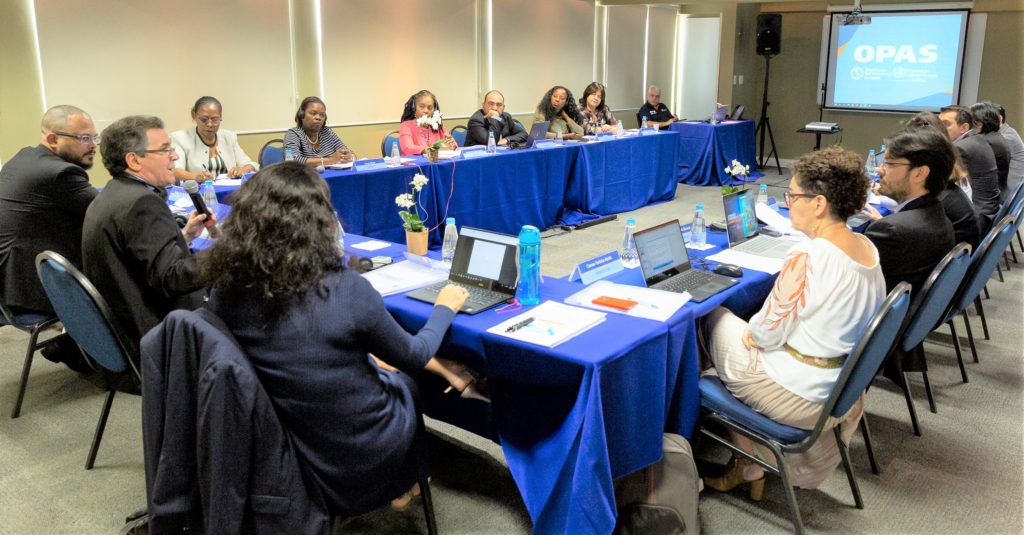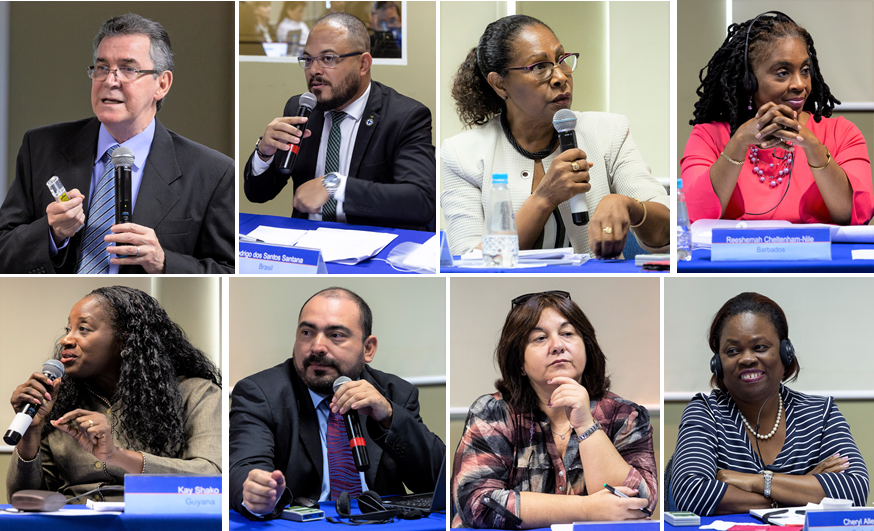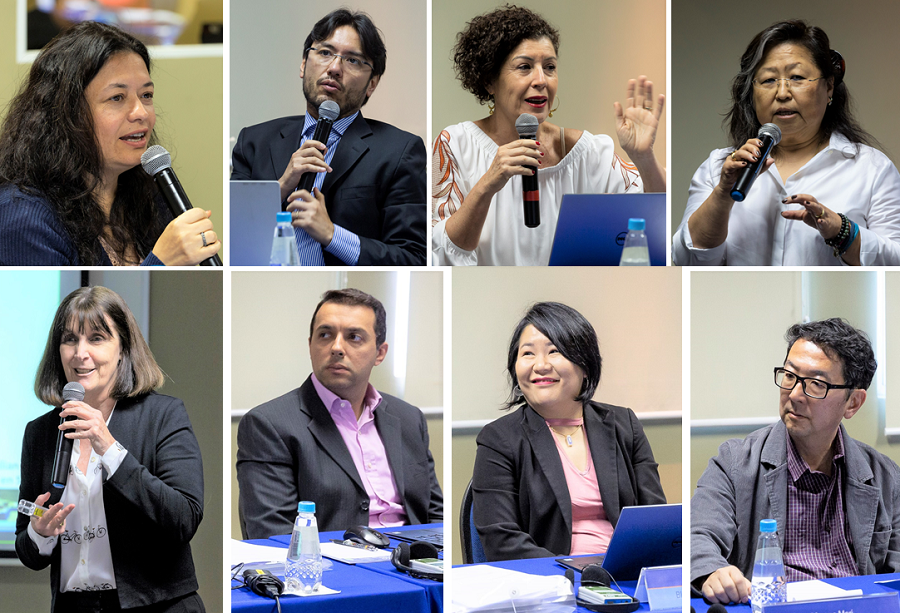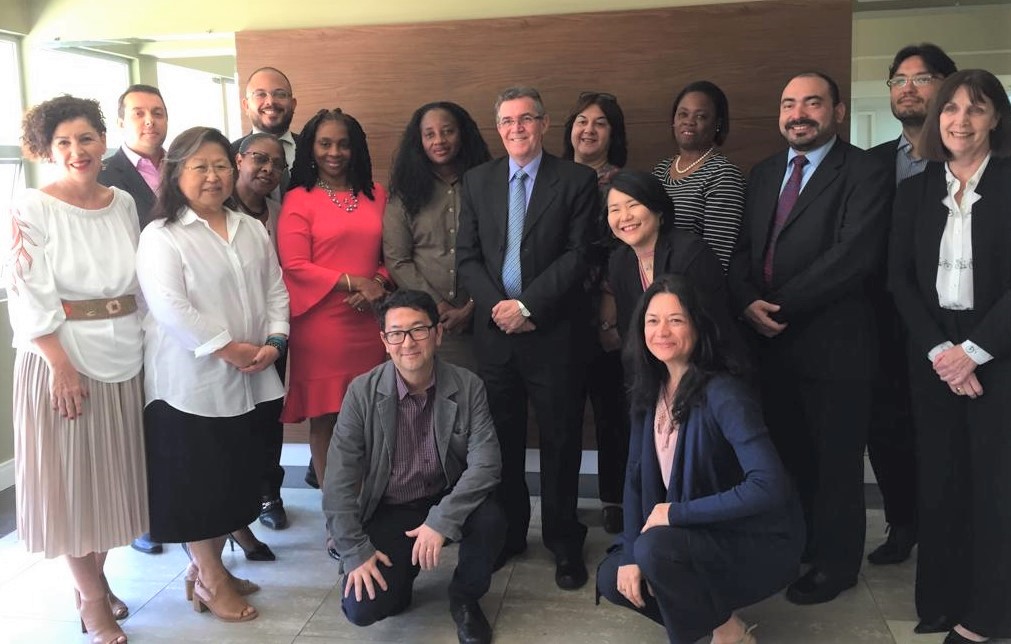The VIII Session of the Advisory Committee (AC) of the Latin American and Caribbean Center on Health Sciences Information (BIREME) was held on October 24 and 25, 2019, in São Paulo, Brazil, with the presence of representatives of five countries of Latin America and the Caribbean: Barbados, Brazil, El Salvador, Guyana and Uruguay. The session was welcomed by a remote speech from Jarbas Barbosa da Silva, Assistant Director of the Pan American Health Organization/World Health Organization (PAHO/WHO) and Interim Director of the Department of Evidence and Intelligence for Action in Health (EIH), to which BIREME is hierarchically connected .
 Diego González Machín, Director of BIREME and ex officio Secretary of the AC, led the session, assisted by the following managers and teams: Silvia Almeida de Valentin, Administrative Management and Planning; Verónica Abdala, Production of Information Sources/Cooperative Information Services; and Renato T. Murasaki, Administration of Information Sources/Methodologies and Information Technologies.
Diego González Machín, Director of BIREME and ex officio Secretary of the AC, led the session, assisted by the following managers and teams: Silvia Almeida de Valentin, Administrative Management and Planning; Verónica Abdala, Production of Information Sources/Cooperative Information Services; and Renato T. Murasaki, Administration of Information Sources/Methodologies and Information Technologies.
Discussions focused on the institutionality, working plans, technical cooperation program and products and services of BIREME in knowledge management, and scholarly communication in health for the Region, particularly in the context of the global and regional mandates of PAHO/WHO with the Sustainable Health Agenda for the Americas 2018-2030 (ASSA 2030) and the Sustainable Development Goals (SDG) of the 2030 Agenda.
 The members from Brazil, Rodrigo Santana dos Santos, and El Salvador, Carlos Enrique Hernandez Ávila, were designated President and Rapporteur of the session, respectively. Together with the other participants, they were in charge of facilitating and reporting the discussions in the context of the presentations, as well as comments on (1) the situation on compliance with the recommendations of the VII Session of the AC; (2) the financial sustainability of BIREME in the context of its management, institutionality and work plans 2018-2019 and the proposal for 2020-2021; (3) advances in scholarly communication; and (4) development and innovation of technical cooperation through, among others, the Virtual Health Library (VHL) and its main sources of information, such as Descriptors in Health Sciences (DeCS) and Latin American Literature in Health Sciences (LILACS).
The members from Brazil, Rodrigo Santana dos Santos, and El Salvador, Carlos Enrique Hernandez Ávila, were designated President and Rapporteur of the session, respectively. Together with the other participants, they were in charge of facilitating and reporting the discussions in the context of the presentations, as well as comments on (1) the situation on compliance with the recommendations of the VII Session of the AC; (2) the financial sustainability of BIREME in the context of its management, institutionality and work plans 2018-2019 and the proposal for 2020-2021; (3) advances in scholarly communication; and (4) development and innovation of technical cooperation through, among others, the Virtual Health Library (VHL) and its main sources of information, such as Descriptors in Health Sciences (DeCS) and Latin American Literature in Health Sciences (LILACS).
During the first day of the Session, the presentations by the Director of the Center on the Mission, Priorities and Strategic Actions of BIREME and on the reelection process for the expert members of the Scientific Committee (SC) of BIREME for the next three years, 2020-2022, since the current mandate expires at the end of 2019, are both noteworthy. During the second day, besides the program, a pre-launching session was held for the Global Index Medicus (GIM) and the Self-learning Course on Scientific Communication, as well as the new portals for LILACS, DeCS, MyVHL, Evidence-Informed Policies, Evidence Maps, International Guideline Search GRADE, Annotated Lists of Medications and Devices, and the new version of the website of the eBlueInfo APP.
Silvia de Valentin (Administrative Manager) presented the current state of development of BIREME’s 2018-2019 work plan and its financial resources, contextualized the 2020-2021 work plan (still under approval) with the PAHO/WHO Strategic Plan for 2020-2025 and highlighted the institutional framework through BIREME’s Statute and elements that show the transparency of the management through the PAHO/WHO Management Information System, Work Day/PMIS.
Lilian Calò (Coordinator of Scientific Communication and Institutional Communication) presented the initiatives on scholarly communication developed by BIREME and the internal and external institutional communication undertaken to disseminate BIREME’s actions in the accomplishment of its mission and objectives.
 Carmen Verónica Abdala (Information Sources Manager) presented the sources of information and scientific evidence that are characteristic of the technical cooperation of BIREME in Latin America and the Caribbean and in other Regions. She considers networking, through the VHL, among others, essential for taking the priorities of the countries of the Region to the Center’s activities.
Carmen Verónica Abdala (Information Sources Manager) presented the sources of information and scientific evidence that are characteristic of the technical cooperation of BIREME in Latin America and the Caribbean and in other Regions. She considers networking, through the VHL, among others, essential for taking the priorities of the countries of the Region to the Center’s activities.
Next, Renato Murasaki (Manager of Methodologies and Information Technologies) highlighted the advances that enable and support the information products and services for technical cooperation, as well as the innovating advances in services and information applications for health professionals.
The members of the AC contributed with information and knowledge by sharing their local and regional experiences, as well as by making recommendations in terms of institutionality, sustainability, strategy and technique. All were unanimous in thanking and recognizing BIREME’s work in favor of equitable access to scientific information, knowledge and evidence, pointing out the high quality of the presentations, exchanges and discussions, as well as the organization of the Session.
 At the end, Diego González Machín declared the VIII Session of the AC closed, acknowledging the AC members for their effective contribution and recognizing the work of the entire staff in the achievement of BIREME’s results as a PAHO/WHO Specialized Center.
At the end, Diego González Machín declared the VIII Session of the AC closed, acknowledging the AC members for their effective contribution and recognizing the work of the entire staff in the achievement of BIREME’s results as a PAHO/WHO Specialized Center.
A final report, consensual for all members and participants, will we presented to the PAHO/WHO Director within 30 days, reflecting in detail the recommendations of the members of the VIII Session of BIREME’s AC, centered on the strengthening of the work plan with its information products and services, scientific evidence and institutional and financial sustainability.
About the Advisory Committee
The main function of the AC, according to the Statute of BIREME, within the context of its new institutional framework (CD49.R5), is to make recommendations to the Director of PAHO/WHO on programmatic functions, founded on the PAHO/WHO Strategic Plan, the Biannual Work Plan and the recommendations of the Scientific Committee. The AC, according to resolutions CD54.R5 and CSP29.R9, is currently composed of representatives of Brazil and PAHO (permanent members), El Salvador (2018-2020), Barbados (2018-2020), Mexico (2019-2021), Guyana (2019-2021) and Uruguay (2019-2021).
Related article
The VII Session of BIREME’s Advisory Committee Takes Place. BIREME Bulletin nº 26. Available at: http://boletin.bireme.org/en/2018/11/27/the-vii-session-of-biremes-advisory-committee-takes-place/